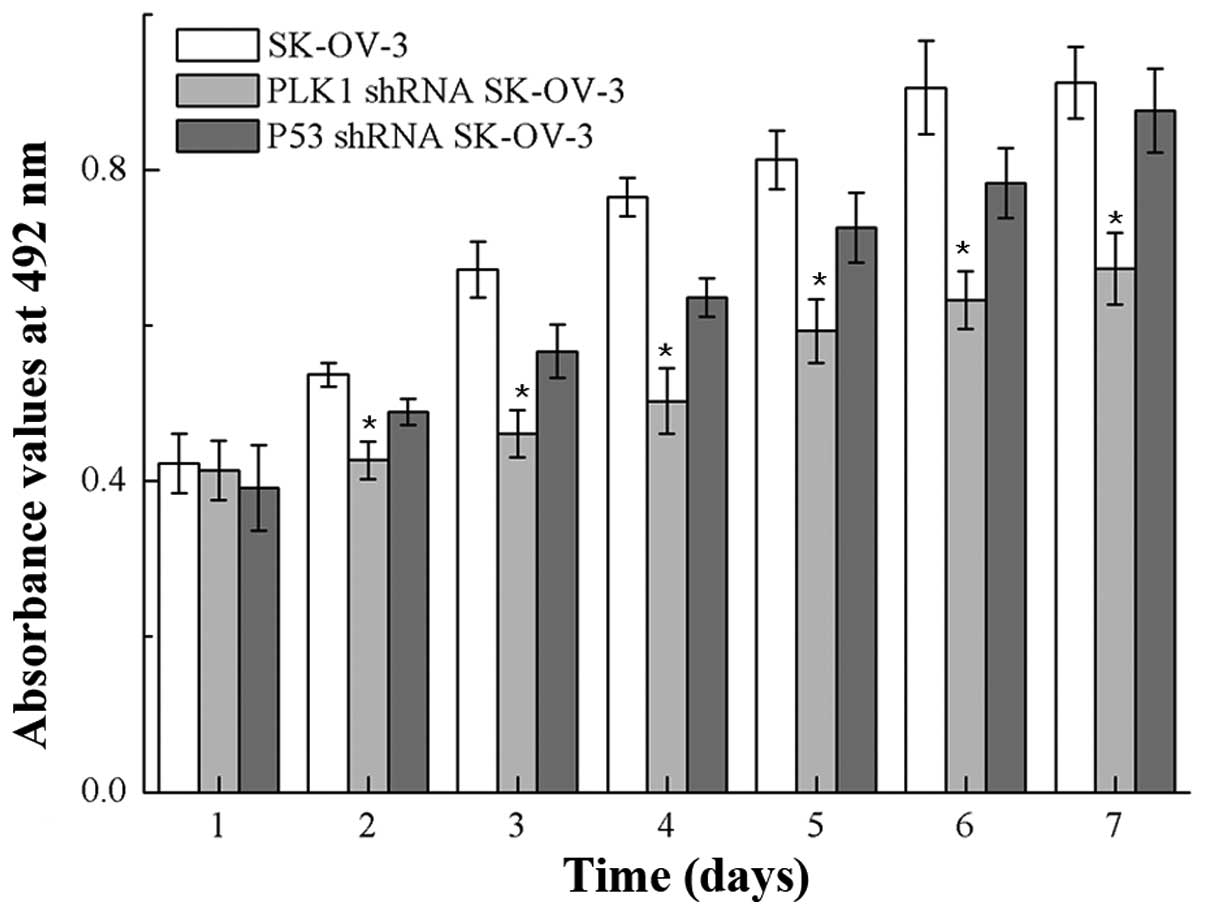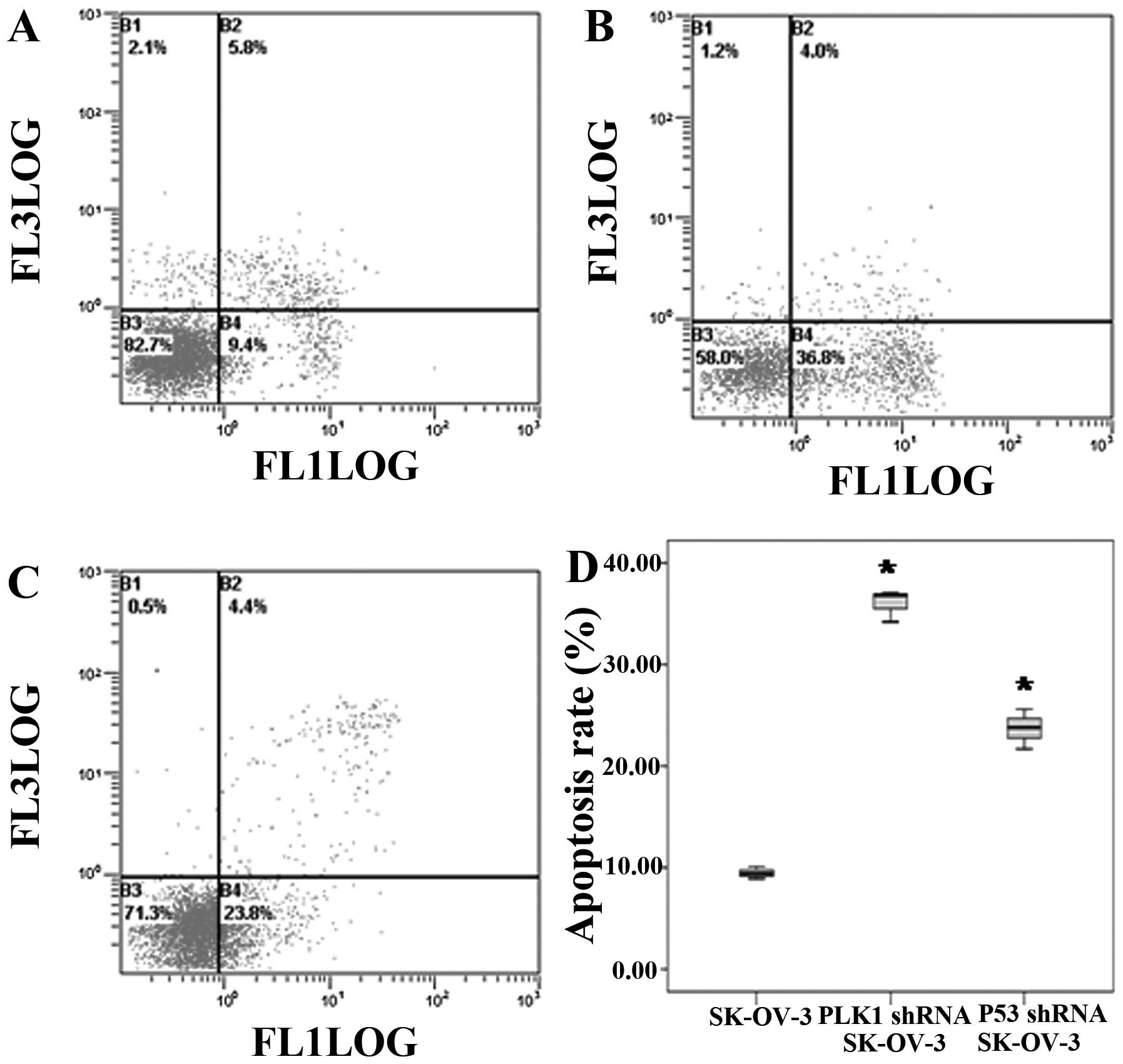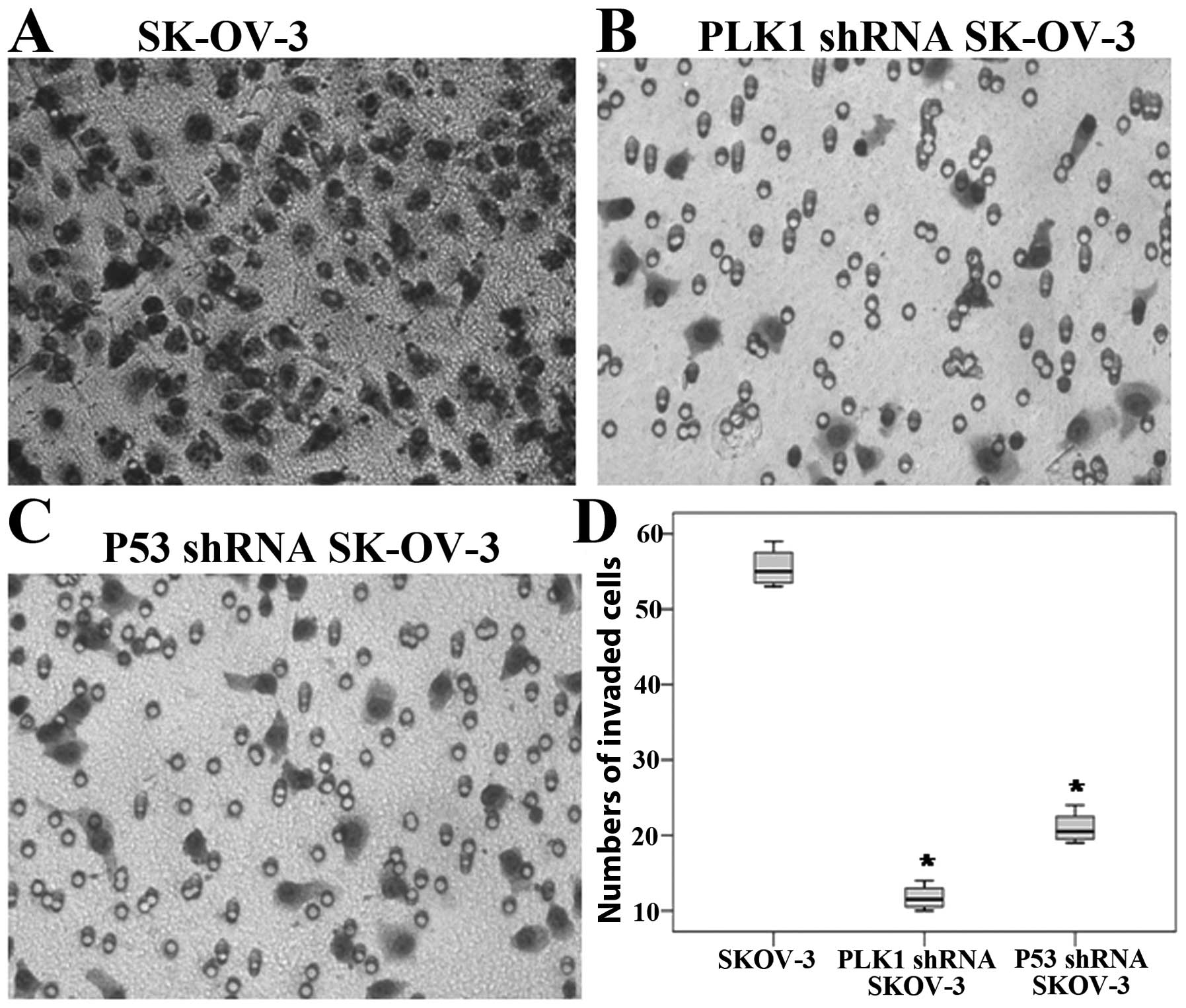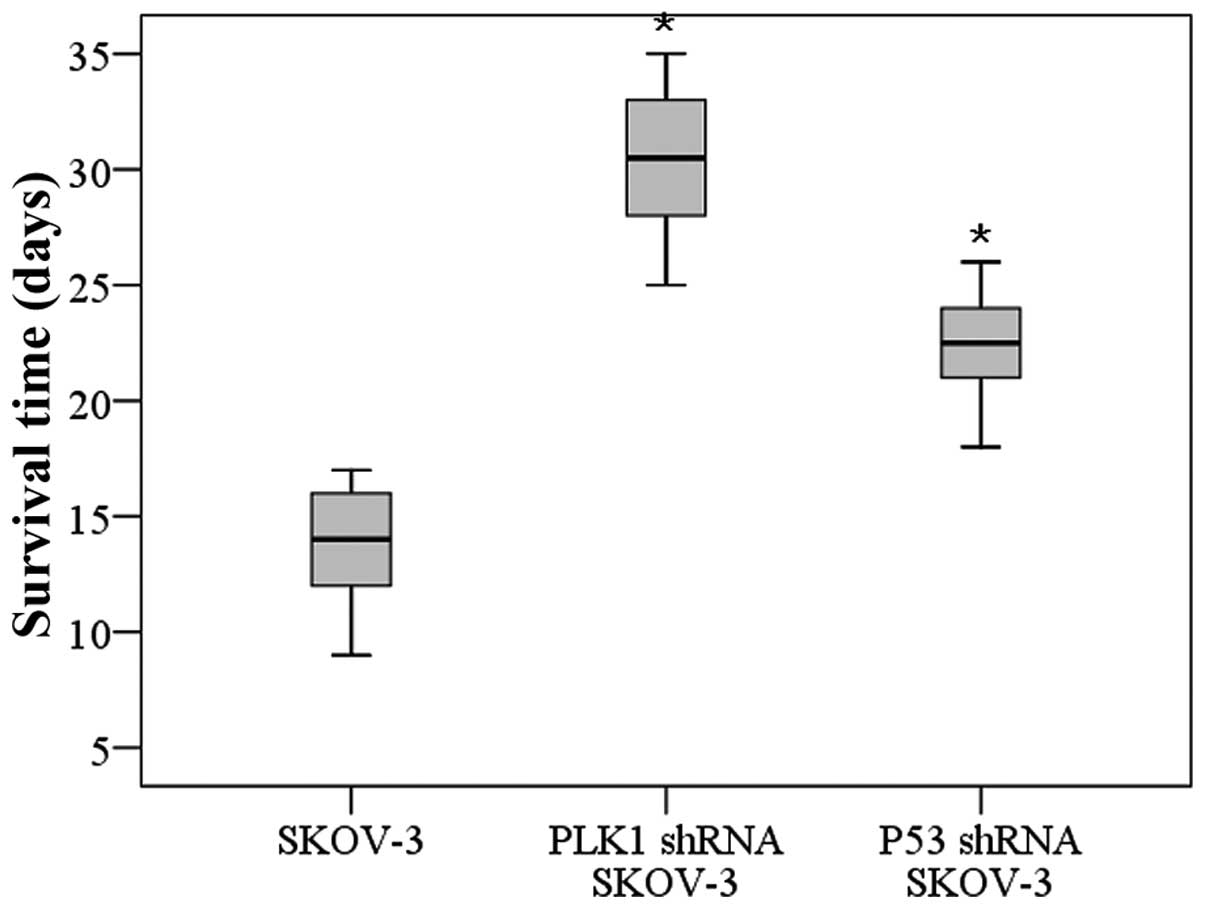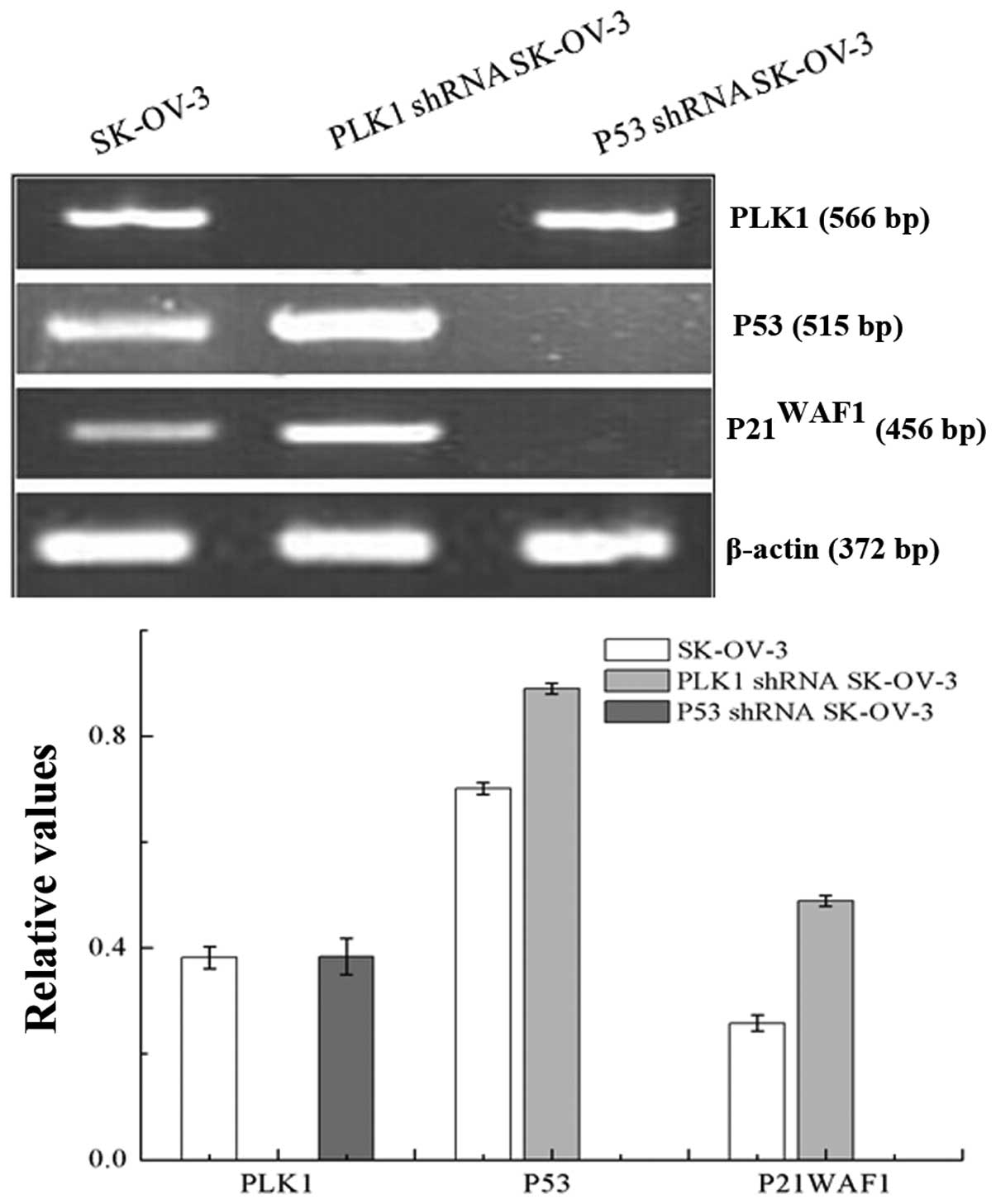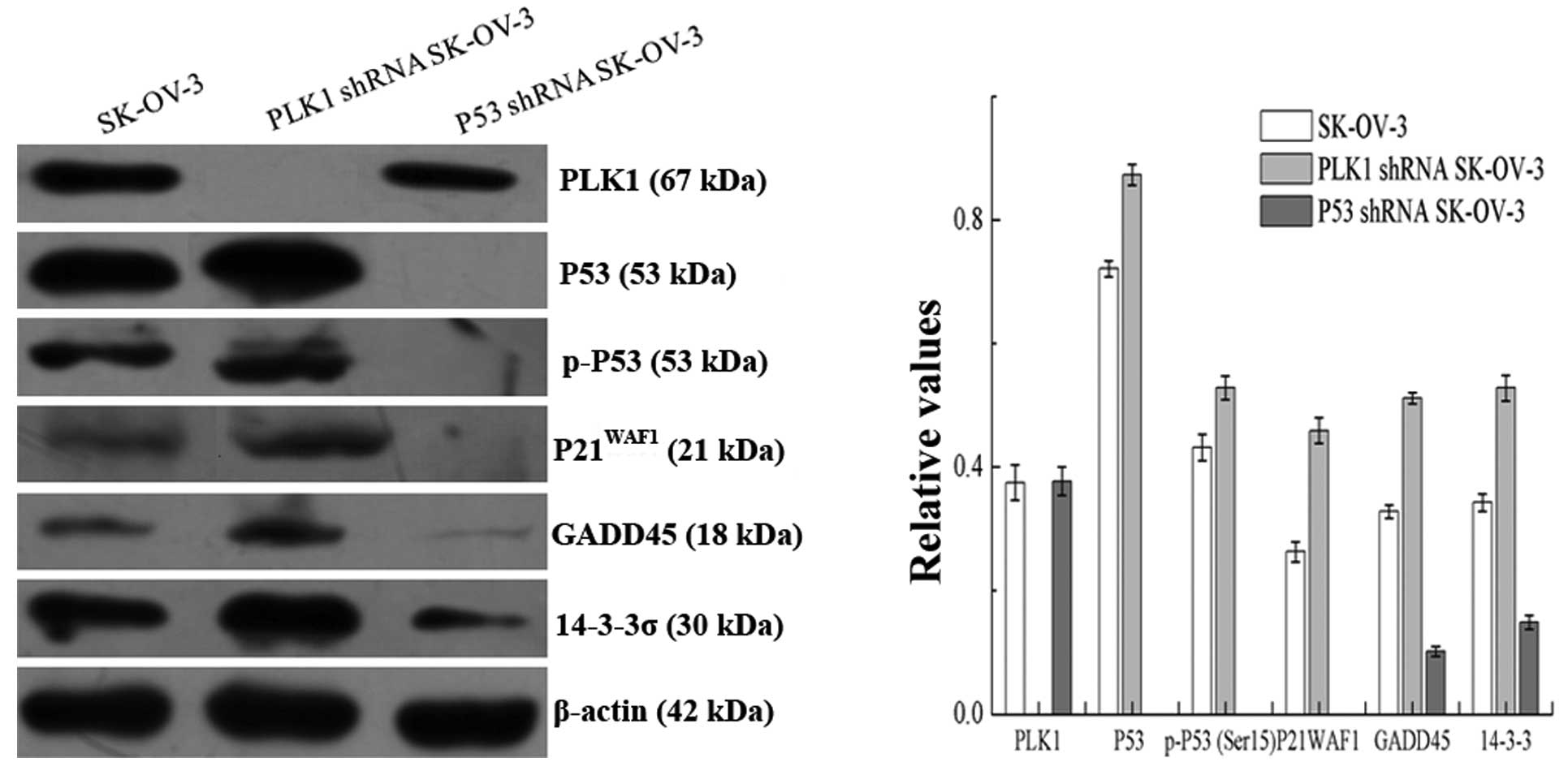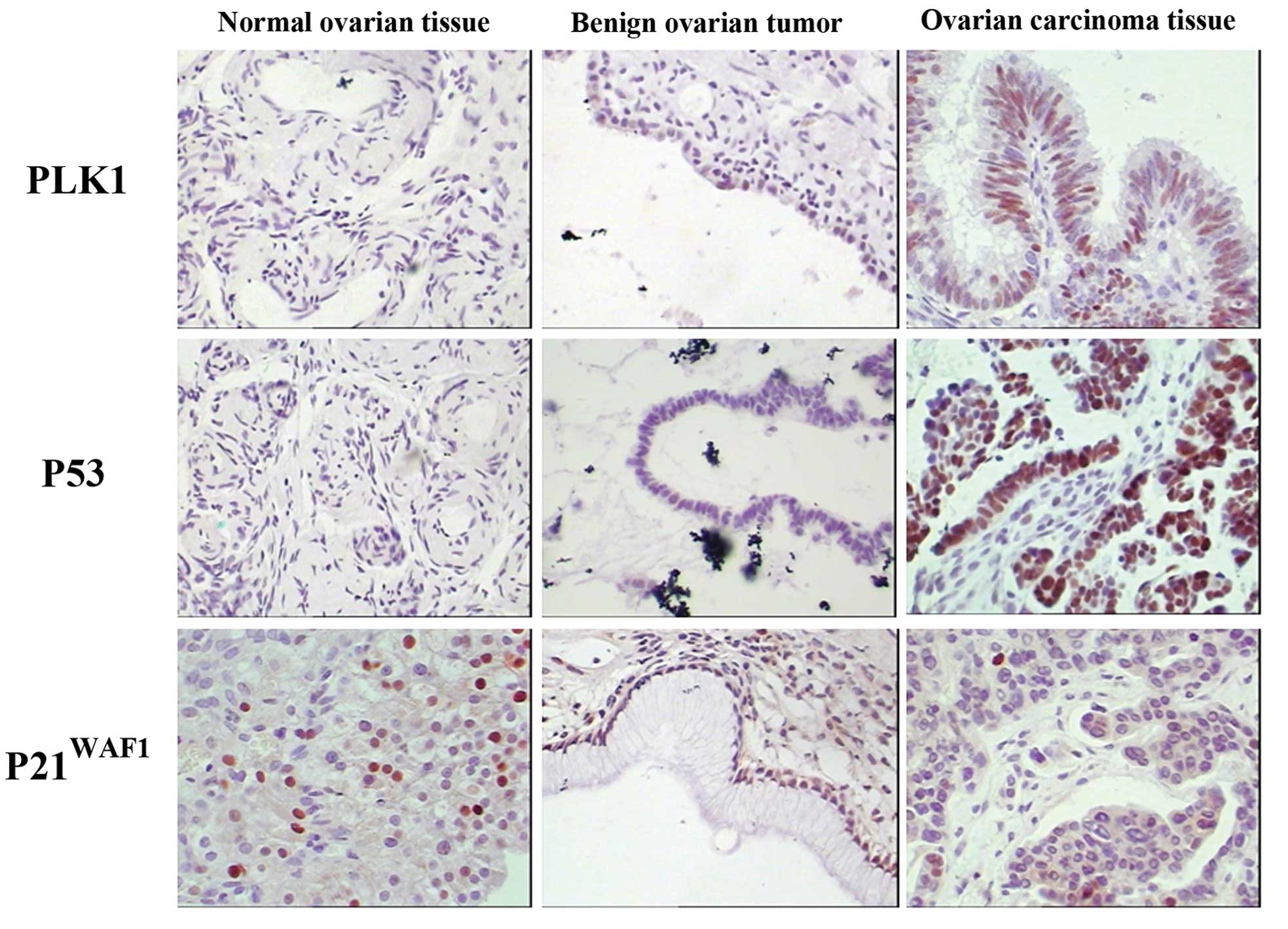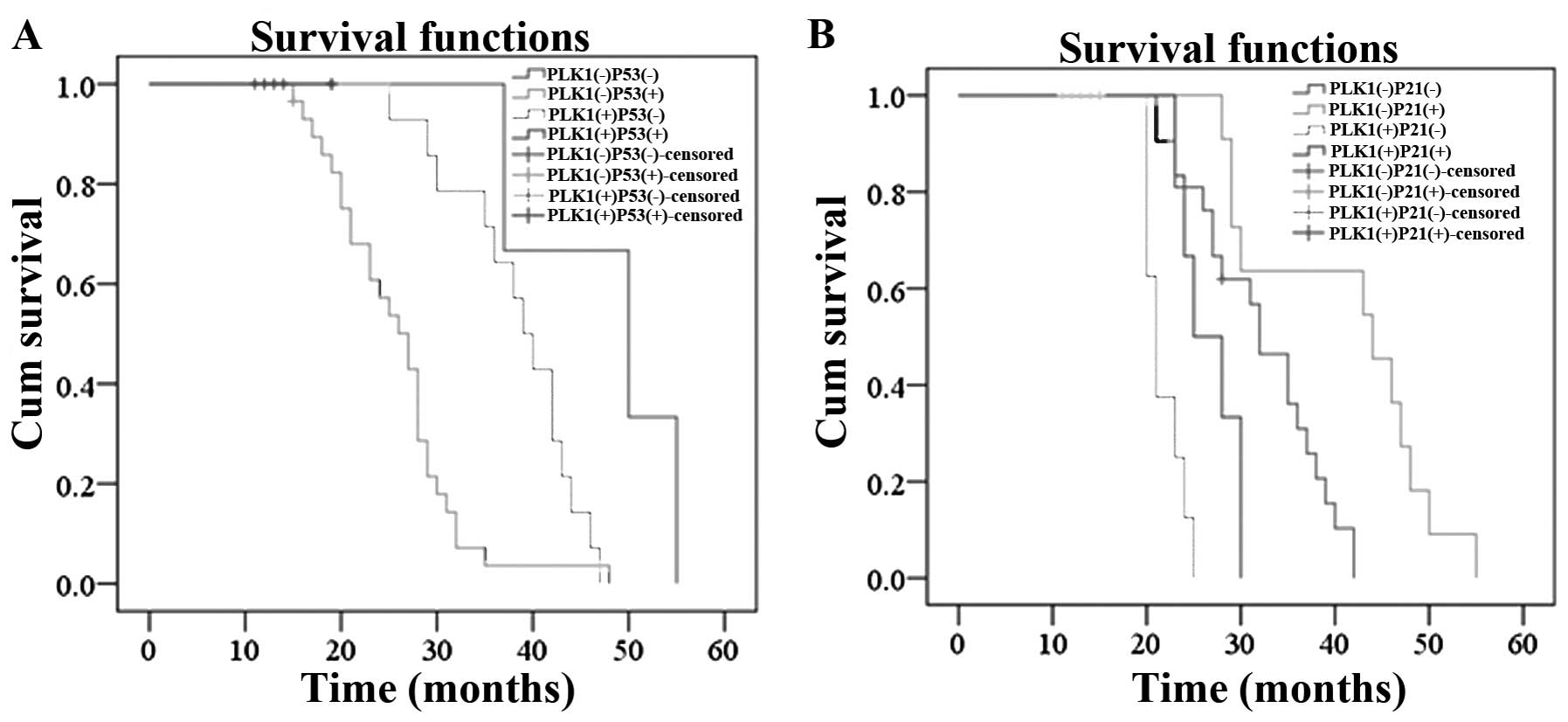|
1
|
Siegel R, Naishadham D and Jemal A: Cancer
statistics, 2013. CA Cancer J Clin. 63:11–30. 2013. View Article : Google Scholar : PubMed/NCBI
|
|
2
|
Strebhardt K and Ullrich A: Targeting
polo-like kinase 1 for cancer therapy. Nat Rev Cancer. 6:321–330.
2006. View
Article : Google Scholar : PubMed/NCBI
|
|
3
|
Kishi K, van Vugt MA, Okamoto K, Hayashi Y
and Yaffe MB: Functional dynamics of Polo-like kinase 1 at the
centrosome. Mol Cell Biol. 29:3134–3150. 2009. View Article : Google Scholar : PubMed/NCBI
|
|
4
|
Wolf G, Elez R, Doermer A, Holtrich U,
Ackermann H, Stutte HJ, Altmannsberger HM, Rübsamen-Waigmann H and
Strebhardt K: Prognostic significance of polo-like kinase (PLK)
expression in non-small cell lung cancer. Oncogene. 14:543–549.
1997. View Article : Google Scholar : PubMed/NCBI
|
|
5
|
Takahashi T, Sano B, Nagata T, Kato H,
Sugiyama Y, Kunieda K, Kimura M, Okano Y and Saji S: Polo-like
kinase 1 (PLKI) is overexpressed in primary colorectal cancers.
Cancer Sci. 94:148–152. 2003. View Article : Google Scholar : PubMed/NCBI
|
|
6
|
Weichert W, Kristiansen G, Winzer KJ,
Schmidt M, Gekeler V, Noske A, Müller BM, Niesporek S, Dietel M and
Denkert C: Polo-like kinase isoforms in breast cancer: expression
patterns and prognostic implications. Virchows Arch. 446:442–450.
2005. View Article : Google Scholar : PubMed/NCBI
|
|
7
|
Weichert W, Schmidt M, Gekeler V, Denkert
C, Stephan C, Jung K, Loening S, Dietel M and Kristiansen G:
Polo-like kinase 1 is overexpressed in prostate cancer and linked
to higher tumor grades. Prostate. 60:240–245. 2004. View Article : Google Scholar : PubMed/NCBI
|
|
8
|
Strebhardt K, Kneisel L, Linhart C, Bernd
A and Kaufmann R: Prognostic value of pololike kinase expression in
melanomas. JAMA. 283:479–480. 2000. View Article : Google Scholar : PubMed/NCBI
|
|
9
|
Mito K, Kashima K, Kikuchi H, Daa T,
Nakayama I and Yokoyama S: Expression of polo-like kinase (PLK1) in
non-Hodgkin’s lymphomas. Leuk Lymphoma. 46:225–231. 2005.
View Article : Google Scholar
|
|
10
|
Yamamoto Y, Matsuyama H, Kawauchi S,
Matsumoto H, Nagao K, Ohmi C, Sakano S, Furuya T, Oga A, Naito K
and Sasaki K: Overexpression of polo-like kinase 1 (PLKl) and
chromosomal instability in bladder cancer. Oncology. 70:231–237.
2006. View Article : Google Scholar
|
|
11
|
Stark GR and Taylor WR: Control of the
G2/M transition. Mol Biotechnol. 32:227–248. 2006.
View Article : Google Scholar : PubMed/NCBI
|
|
12
|
Levine AJ: p53, the cellular gatekeeper
for growth and division. Cell. 88:323–331. 1997. View Article : Google Scholar : PubMed/NCBI
|
|
13
|
Charrier-Savournin FB, Château MT, Gire V,
Sedivy J, Piette J and Dulic V: p21-mediated nuclear retention of
cyclin B1-Cdk1 in response to genotoxic stress. Mol Biol Cell.
15:3965–3976. 2004. View Article : Google Scholar : PubMed/NCBI
|
|
14
|
Abbas T and Dutta A: p21 in cancer:
intricate networks and multiple activities. Nat Rev Cancer.
9:400–414. 2009. View
Article : Google Scholar : PubMed/NCBI
|
|
15
|
Song B, Liu XS and Liu X: Polo-like kinase
1 (Plk1): an unexpected player in DNA replication. Cell Div.
7:32012. View Article : Google Scholar : PubMed/NCBI
|
|
16
|
Yim H and Erikson RL: Polo-like kinase l
depletion induces DNA damage in early S prior to caspase
activation. Mol Cell Biol. 29:2609–2621. 2009. View Article : Google Scholar : PubMed/NCBI
|
|
17
|
Hayashi MT and Karlseder J: DNA damage
associated with mitosis and cytokinesis failure. Oncogene.
32:4593–4601. 2013. View Article : Google Scholar : PubMed/NCBI
|
|
18
|
Murray AW: Creative blocks: cell-cycle
checkpoints and feedback controls. Nature. 359:599–604. 1992.
View Article : Google Scholar : PubMed/NCBI
|
|
19
|
Jeong JH, Kang SS, Park KK, Chang HW,
Magae J and Chang YC: p53-independent induction of G1 arrest and
p21WAF1/CIP1 expression by ascofuranone, an isoprenoid
antibiotic, through downregulation of c-Myc. Mol Cancer Ther.
9:2102–2113. 2010. View Article : Google Scholar : PubMed/NCBI
|
|
20
|
Ando K, Ozaki T, Yamamoto H, Furuya K,
Hosoda M, Hayashi S, Fukuzawa M and Nakagawara A: Polo-like kinase
1 (Plkl) inhibits p53 function by physical interaction and
phosphorylation. J Biol Chem. 279:25549–25561. 2004. View Article : Google Scholar : PubMed/NCBI
|
|
21
|
Ahmad N: Polo-like kinase (Plk) 1: a novel
target for the treatment of prostate cancer. FASEB J. 18:5–7. 2004.
View Article : Google Scholar : PubMed/NCBI
|
|
22
|
Weichert W, Denkert C, Schmidt M, Gekeler
V, Wolf G, Köbel M, Dietel M and Hauptmann S: Polo-like kinase
isoform expression is a prognostic factor in ovarian carcinoma. Br
J Cancer. 90:815–821. 2004. View Article : Google Scholar : PubMed/NCBI
|
|
23
|
Marks JR, Davidoff AM, Kerns BJ, Humphrey
PA, Pence JC, Dodge RK, Clarke-Pearson DL, Iglehart JD, Bast RC Jr
and Berchuck A: Overexpression and mutation of p53 in epithelial
ovarian cancer. Cancer Res. 51:2979–2984. 1991.PubMed/NCBI
|
|
24
|
Skírnisdóttir I and Seidal T: Prognostic
impact of concomitant p53 and PTEN on outcome in early stage (FIGO
I–II) epithelial ovarian cancer. Int J Gynecol Cancer.
21:1024–1031. 2011. View Article : Google Scholar
|
|
25
|
Berchuck A, Kohler MF, Hopkins MP,
Humphrey PA, Robboy SJ, Rodriguez GC, Soper JT, Clarke-Pearson DL
and Bast RC: Overexpression of p53 is not a feature of benign and
early-stage borderline epithelial ovarian tumors. Gynecol Oncol.
52:232–236. 1994. View Article : Google Scholar : PubMed/NCBI
|
|
26
|
Buchynska LG, Nesina IP, Yurchenko NP,
Bilyk OO, Grinkevych VN and Svintitsky VS: Expression of p53,
p21WAF1/CIP1, p16INK4A and Ki-67 proteins in serous ovarian tumors.
Exp Oncol. 29:49–53. 2007.PubMed/NCBI
|
|
27
|
Terauchi F, Okamoto A, Nagashima T,
Kobayashi Y, Moritake T, Yamamoto Y, Takakura S, Iwaki S and Ogura
H: Clinical significance of p21WAF1/CIP1 and p53
expression in serous cystadenocarcinoma of the ovary. Oncol Rep.
14:363–368. 2005.PubMed/NCBI
|
|
28
|
Shi HR and Zhang RT: Expression and
significance of P53, P21WAF1 and CDK1 proteins in epithelial
ovarian cancer. Ai Zheng. 28:882–885. 2009.(In Chinese). PubMed/NCBI
|
|
29
|
Banin S, Moyal L, Shieh S, Taya Y,
Anderson CW, Chessa L, Smorodinsky NI, Prives C, Reiss Y, Shiloh Y
and Ziv Y: Enhanced phosphorylation of p53 by ATM in response to
DNA damage. Science. 281:1674–1677. 1998. View Article : Google Scholar : PubMed/NCBI
|
|
30
|
Canman CE, Lim DS, Cimprich KA, Taya Y,
Tamai K, Sakaguchi K, Appella E, Kastan MB and Siliciano JD:
Activation of the ATM kinase by ionizing radiation and
phosphorylation of p53. Science. 281:1677–1679. 1998. View Article : Google Scholar : PubMed/NCBI
|















